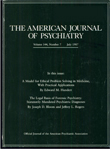Application of biological markers in depression secondary to thyrotoxicosis
Abstract
Biological markers of affective disorders have not been studied intensively in patients with secondary depression. An elderly woman with severe delusional depression secondary to thyrotoxicosis was monitored with weekly dexamethasone suppression tests (DSTs) and three sleep electroencephalography (EEG) evaluations. She received treatment only for her thyrotoxicosis, but her depression resolved completely. The serial DSTs were normal throughout her depression, consistent with the specificity of this test for primary endogenous depression. The sleep EEG erroneously suggested a diagnosis of primary depression but effectively monitored clinical improvement. Biological markers may have applicability in evaluating and monitoring patients with secondary depression.
Access content
To read the fulltext, please use one of the options below to sign in or purchase access.- Personal login
- Institutional Login
- Sign in via OpenAthens
- Register for access
-
Please login/register if you wish to pair your device and check access availability.
Not a subscriber?
PsychiatryOnline subscription options offer access to the DSM-5 library, books, journals, CME, and patient resources. This all-in-one virtual library provides psychiatrists and mental health professionals with key resources for diagnosis, treatment, research, and professional development.
Need more help? PsychiatryOnline Customer Service may be reached by emailing [email protected] or by calling 800-368-5777 (in the U.S.) or 703-907-7322 (outside the U.S.).



